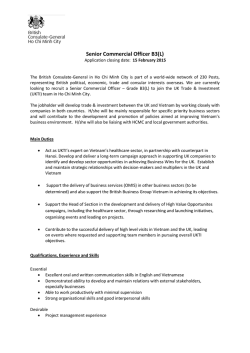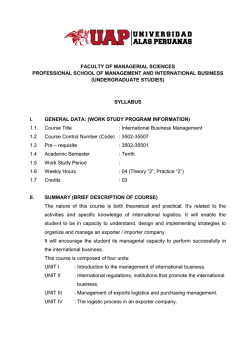
The small business growth plan
February 2015 The small business growth plan Everything you need to take your company to the next level “Withtailoredadvice, Itookmybusiness tothenextlevel” AndrewRamroopOBE, CEO of Maurice Sedwell Helping your company to grow and prosper Small businesses are powering our economic recovery, they’re creating jobs, exporting to new markets, regenerating parts of the UK and developing innovative new products. Making up 99 per cent of all companies in the UK, our small businesses employ more than 11 million people – and their entrepreneurial zeal is what makes Britain great. It is also the strong leadership directing these businesses that helps them to grow and succeed in a competitive climate. My parents ran a small business and their struggle and hard work have made me determined to fight for small business in government. We’ve kick-started a range of support services and funding streams that mean there has never been a better time to run a business in the UK. We’re on the side of the hard-working heroes of our economy. Our long-term economic plan is delivering. We will help more people to build a business, hire more staff and work with us to build a better Britain. I hope you find this guide useful. Matt Hancock Minister of State for Business and Enterprise www.greatbusiness.gov.uk Group editor Lysanne Currie Writer Christian Koch Chief sub-editor Robert Sly Creative director Chris Rowe Designer Mat Deaves Commercial sales director Jo McGraw Advertising manager Ben Hammond Marketing director Tom Christie-Miller Production manager Lisa Robertson Editorial 020 7766 8950 [email protected] Advertising 020 7766 8900 [email protected] Production 020 7766 8960 [email protected] Institute of Directors 020 7839 1233 www.iod.com Published by Director Publications Ltd for the Institute of Directors, 116 Pall Mall, London, SW1Y 5ED. Opinions expressed do not necessarily reflect IoD policy. The IoD accepts no responsibility for views expressed by contributors. Contents BUSINESS IS GREAT BRITAIN 4 EXPERT ADVICE FINANCIAL GUIDANCE 6 HELP WITH EXPORTING How the government supports small businesses and can facilitate growth Businesses can now get a range of bespoke advice from mentoring to exporting to finance. To discover how Maurice Sedwell benefited from Government support and how you can too, visit greatbusiness.gov.uk/accelerate How to access the government’s supportive business tax structures and financial support packages for small companies 8 How to make the most of government business advisers, mentors and more 10 Everything the small British business and start-up owner needs to know about UKTI, tax benefits and expanding overseas February 2015 Director 3 A gateway to emerging markets CASE STUDY Helping great British small businesses The government can assist your small company at every stage of the growth trajectory, from registration to acceleration. Here’s how... * BIBBY FINANCIAL SERVICES REPORT, 2013 P icture the scene: you’re a small startup. Turnover forecasts are OK, you’ve started to recruit staff and – thanks to social media – people outside your home town are finally hearing about you. And yet the sum total of your expert support consists of whatever advice your bank manager dished out last week (indeed, a recent study* found that one in four small businesses trust family/friends rather than the experts). It would be difficult to believe that MPs in Westminster would ever have you on their radar. Right? Wrong. Small businesses are viewed as the lifeblood of the national economy, integral to its recovery and employing around 80 per cent of the UK workforce (24.3 million people) with a combined turnover of £3,300bn. Sadly, most smallbusiness owners are unaware – or simply too busy – to realise that they can make the most of a knowledgerich array of governmental support, ranging from the British Business Bank’s £45m funding package to a 4 Director February 2015 £10m start-up fund to help entrepreneurial scientists. A first step on your start-up journey should be to write a business plan. At greatbusinessgov.uk, some of the best UK business brains have provided business plan information, including templates from Barclays and Lloyds. Startups can also receive help from government-affiliated organisations such as the National Enterprise Network greatbusiness.gov.uk The one-stop website for all your business advice Many a successful business leader will explain their triumphs by claiming to have done it alone. But to successfully grow any company, support and advice is essential. Luckily for today’s small-business leaders, it’s now all in one place. The government’s greatbusiness.gov.uk website has all the information, links and services you need to propel your company forward, whether it’s case studies on exporting, apprenticeship advice or the lowdown on accessing funding. www.greatbusiness.gov.uk and Enterprise Nation. Starting a business from home? Check out the government’s 45-page Home Business Guide. Need a mentor? Then use one of its myriad mentoring programmes, such as Mentorsme, Prime (for businesses started by the over-50s) and the Prince’s Trust (for 18 to 30-year-olds). GROWING A BUSINESS Identifying the right kind of financing is also crucial. The British Business Bank’s British Finance Guide is a good place to start (also check out its website at betterbusinessfinance.co.uk), while the government offers a plethora of alternative funding schemes, from Start Up Loans to the UK Business Angels Association, and crowdfunding options. Researching and developing your product or service can be expensive and time-consuming, which is why tax reliefs and grants exist such as Innovate UK Smart grants and the Small Business Research Initiative. There are also numerous tax reliefs, such as the UK’s 24 enterprise zones, the Seed Enterprise Investment Scheme (SEIS) and the chance to reduce your employees’ national insurance contributions through employment allowance. Claramount Up and running: there’s plenty of help at hand to aid developing small businesses and start-up owners It’s essential to develop an online presence for your fledgling firm too. Even though total website sales in the UK are worth £164bn, nearly half of UK small companies don’t use the web for business. For them, and you, resource-heavy website digitalskills.com swarms with advice on building websites, search-engine optimisation, plus using e-commerce to sell your products and services. Growing a business isn’t without challenges, not least the issue of recruitment. The government backs schemes such as the Small Business Recruitment Service to help companies hire new staff, while employment dispute peacemaker Acas has a stepby-step recruitment guide. HELPING HANDS With exports of British goods hitting a record high in 2013, there has never been a better time for small firms to seize the advantage. UK Trade & Investment is a great place to start, especially as its advice is free and companies earn, on average, £100,000 in extra sales within 18 months of first consulting UKTI (see p10). As your company grows, so does the need to protect your idea. The Intellectual Property Office and Companies House offer free seminars, while there’s also free advice from the Chartered Institute of Patent Attorneys. And the government continues to help once your business has been scaled to a more comfortable level. To develop innovative ideas, Catapult Centres (catapult. org.uk) can link you to specialised expertise, cuttingedge equipment, and R&D. To pick the brains of academics, try consulting connect. innovateuk.org. And if you’ve got plans to build a talent pipeline or apprenticeship programme, then seek advice at apprenticeships.org.uk. For more information on financial and export services, see p6 and p10 Derbyshire-based engineering business Claramount took on an apprentice with the help of an apprenticeship grant for employers – a £1,500 grant available to small firms looking to employ a young person – and was soon reaping the benefits. The company, which supplies fluid distribution and dosing equipment, hired a 16-year-old, Joel Wright, to join the team – and enjoyed improvements in efficiency and reputation. “I could see that because our customers are so diverse, if I took on a skilled engineer I would still have to train them for a year,” explains director Chris Wright. “I wanted to give a young person a chance to learn a trade, and develop my business at the same time.” Claramount worked with the National Apprenticeship Service and social enterprise Learning Unlimited to advertise the vacancy for free on the apprenticeship vacancies site. The grant helped it cover initial costs including insurance, a first aid course for a new starter, and workwear. “Our customers know there is a shortage of skilled engineers, and they like to see that a company has taken on an apprentice. It looks good that we’re investing in the future of engineering.” The business will employ Joel as a full-time service engineer when he finishes his apprenticeship – and plans to hire more apprentices in the future. www.claramount.com February 2015 Director 5 A gateway to emerging markets CASE STUDY Smart funding for small businesses Funding options running dry? In a right old tax tumult? Accounts stuck in a monetary minefield? The government can help with the financial issues your business may encounter T here was a time when getting a business loan was easy. You went to your local bank branch, had a ‘meaningful chat’ with the shiny-suited manager – and soon the money was in your account. Today, it’s a little more difficult. A bank loan isn’t the only way small companies can receive funding, leaving many small business-owners feeling they need a PhD in advanced accountancy to understand all the funding options available. But support is at hand. As part of its pledge to help small businesses, the government’s groundbreaking greatbusiness.gov.uk website combines easyto-use resources and financial expertise to suit a range of companies. My Business Support Tool (greatbusiness.gov.uk/ mybusinesssupporttool), for example, provides tailor-made reports on funding sources. For riskier new ventures, equity investment (whereby capital is raised through 6 Director February 2015 selling shares in the business) is usually advisable. There has never been a better time either – the British angel community currently invests an estimated £850m a year and can be found at the Business Angels Association (ukbusinessangelsassociation. org.uk) directory. Equity can also be obtained via the Business Growth Fund and the British Business Bank’s (british-business-bank.co.uk) equity finance schemes. FUNDING OPTIONS Debt finance is more suitable for less riskier ventures, with almost all businesses using it at some stage. The government’s Start Up Loans initiative is particularly useful for new entrepreneurs, backing an estimated 41 Plotting a future: whatever your company’s aims, it’s likely the government can help indirectly Alternative sources of funding are fast becoming popular among small businesses” businesses per day (average loan size: £5,286). Eclipse Property Cornwall, founded by an ex-Royal Navy veteran, is one of the 22,636 businesses it has backed so far. Indeed, whatever your company’s aims, it’s likely the government can indirectly help. Businesses planning to export could seek debt finance through UK Export Finance. Tech firms could benefit from Innovate UK’s SMART grants, of up to £250,000 to run an R&D project. Alternative funding is becoming increasingly popular among small businesses too. Both the UK Crowdfunding Association (ukcfa.org.uk) and the Peerto-Peer Finance Association (http://p2pfa.info) are strong official organisations that could help connect you to lenders/investors. The government’s Community Development Finance Institutions (CDFIs) could also provide credit for businesses unable to get finance from high-street banks. Elsewhere, free financial advice abounds for new entrepreneurs. The expertise of over 27,000 mentors can be mined via the British Bankers Association’s Mentorsme scheme, while small business-owners can also get a free consultation about business growth with an Helping hands: even if you must visit the bank manager, the government has advice there too ICAEW (Institute of Chartered Accountants) accountant at http://find.icaew.com. TAX RELIEFS In addition, the government provides generous tax reliefs to companies, whether through business rate reliefs, the chance to work in one of the UK’s 24 incentiveheavy enterprise zones or reducing national insurance contributions for employees via Employment Allowance. You can also claim capital allowances when buying assets such as equipment or machinery, and delay paying capital gains tax if selling business assets. The Patent Box break allows firms to pay much lower taxes on profits from patented inventions, while companies can apply for tax credits to assist R&D. A perennial bugbear affecting company cashflow is late payments. However, if Trunki a customer is late paying for goods, you can claim interest and debt recovery costs – see greatbusiness.gov.uk/dealingwith-late-payments. The Prompt Payment Code and Small Claims Court can also aid your case. And even if you do decide to visit that bank manager, the government has advice on that too, whether it’s the Business Banking Insight Survey’s TripAdvisor-style bank reviews, or shifting current account provider through Current Account Switching Service (http:// www.paymentscouncil.org. uk/switch_service). And if banks have turned down your funding application? Try the government’s Banks Appeals process, which has generated £46m of further lending to small businesses since 2011. Seeking finance for your firm has never been easier. Stand on any airport travellator and within minutes you’ll see one. Miniature, ride-on suitcases, often resembling a ladybird or Gruffalo, and lugged or ridden by its child owners, are becoming an increasingly common sight. Chances are, they’re produced by UK firm Trunki, which has been making travel products for children since 2003. Unsurprisingly for a company that innovates at such a relentless pace, Trunki (and its founder Rob Law, above) has occasionally had to rely on the government’s financial help. In 2012, when Trunki started reshoring its manufacturing, it was aided by the Patent Box tax break, which allows companies to apply a lower rate of corporation tax to profits earned from its patents. “The Patent Box is a great way for the government to motivate companies to stay in the UK and not to offshore for tax planning,” says Law. “And it rewards inventive companies, which can only be a good thing.” Growth in Asia and North America has seen Trunki consult UKTI, while the company has also gained R&D tax credits on the product development of its BoostAPak children’s car seat (it doubles as a backpack). Law adds: “You have to work out what the tax relief is applicable for, so it is more complicated, but you can get accountants to help you.” www.greatbusiness.gov.uk www.trunki.co.uk February 2015 Director 7 A gateway to emerging markets CASE STUDY Getting the right advice Whether you’re looking for a mentor, funding to boost product development or seeking contacts to find new customers, the government can help connect you with experts Whatever stage of development your business might be at, there is a government-affiliated organisation out there to dispense free advice and support. For nervous start-up entrepreneurs, solace can be sought via initiatives such as the New Entrepreneurs Foundation, School for Startups, Shell Livewire (for 16 to 30-year-old entrepreneurs) and Enterprise Nation and UnLtd (social entrepreneurs). More established small firms could also benefit from the personal account managers at the Business Growth Service, which tailors support packages to suit your needs. For more free advice, consult UKTI (for exporting), the Chartered Institute of Patent Attorneys (IP advice) and the Institute of Trade Mark Attorneys (trademarks). RESEARCH AND DEVELOPMENT Whether it is inventing the worldwide web, developing penicillin or creating Moshi 8 Director February 2015 Monsters, the innovatory bent of Britons seems to be innate. In today’s growth-hungry economy, that innovation is more prized than ever, which is why the government is keen to harness it via a host of grants and schemes. To develop an idea, smallbusiness owners could have 60 per cent of their R&D project costs funded by an Innovate UK Smart grant. Or maybe consult one of seven national Catapult Centres (catapult.org.uk). There FIND A MENTOR Even the loftiest chief executives will admit that they could benefit from sage advice now and again. Now, today’s aspiring entrepreneurs can harvest expertise from one of the many mentorship programmes. Comprehensive MentorsMe (mentorsme. co.uk) is a good place to start, promising to partner users with a suitable mentor. For social entrepreneurs, there’s social enterprise mentoring, while 18 to 30-year-olds could receive Prince’s Trust coaching, and face-to-face advice is also available from the British Library Business & IP Centre. GREAT LEADERSHIP Web savvy: making sure you stand out online is vital for start-ups Innovation is more prized than ever in the growth-hungry economy of today” are also numerous R&D tax credits, such as Patent Boxes (which offer reduced corporation tax rate on profits from patented inventions), as well as innovation vouchers (up to £5,000) and EU funding programmes galore. There is no such thing as a born leader. As anybody from Sir Philip Green to Sir Richard Branson will attest, iron-fistedness doesn’t run in the DNA. Instead, you acquire leadership through experience and training. One way to develop your supervising skills is via conciliation service Acas (acas.org.uk), which has a range of free online courses and a handy Model Workplace tool for gauging how effective your company is at people management. Meanwhile, the Employer Ownership of Skills, the Growth and Innovation Fund and Employer Investment Fund all have Maurice Sedwell Helping hands: entrepreneurs can tap into a wealth of advice from business mentors leadership training funds. You could also receive £2,000 for training by applying for a Growth Voucher while design-centric bosses could get subsidised coaching from the Design Council’s Design Leadership Programme. NETWORKING There is a wealth of networking opportunities available to entrepreneurs. For high-growth firms, GrowthAccelerator allows you to fraternise in a world of businesses just like yours, via its exclusive events and training. To tap into the latest academic knowledge in your field, try joining _connect (connect.innovateuk.org). There are also numerous business networks for women, such as Enterprising Women, Everywoman and Forward Ladies. Visit www.gov.uk/ events-finder to find out more about local events. HUMAN RESOURCES Pre-empt employee disputes by signing up to Acas’s people management training courses. The greatbusiness.gov.uk website is also a good resource for finding information on recruiting staff, employment laws/regulation, training, hiring apprentices/trainees, and flexible working. SHOUT ABOUT IT Savile Row, London’s storied street of tailoring, is internationally recognised as being the yardstick by which others are judged. Emblematic of its appeal is Maurice Sedwell, which makes bespoke threads for customers in 58 countries (70 per cent of sales are outside the EU). Its transition from politely revered British tailor to global brand was partly spurred by the decision of owner Andrew Ramroop (below) to go on an UKTI export trip to New York in recession-hit 1992. Thanks to UKTI advice (plus Ramroop’s hard work: he sent personal letters to 60 clients beforehand), the trip paid off handsomely. US earnings soared and the company soon became the internationally respected brand it is today. Like the government, Ramroop – who runs the Savile Row Academy apprenticeship scheme – strongly advocates giving advice wherever possible. “If you keep your skills to yourself, all that will happen is that you will get old, retire and die – and your business will follow suit,” he says. www.savilerowtailor.com Promoting your business has never been cheaper, but how do you ensure that you stand out online from competitors? The Enterprise IT guide can advise on the right web advertising for you. Want to sell products overseas through e-commerce? Check out UKTI’s e-Exporting Programme. Meanwhile, greatbusiness.gov.uk can assist with social media engagement, running surveys, plus other digital skills. www.greatbusiness.gov.uk February 2015 Director 9 CASE STUDY The export factor Growing your business overseas can be crucial to sustaining success, and to the UK economy. The government has a range of resources to help you get started Y ou don’t need to cite the pan-global ubiquity of Union Jack handbags brandished by fashionistas in the Far East or One Direction posters on US teenagers’ walls to confirm the ‘Made in Britain’ brand is coveted around the world. Name a product and chances are, the UK exports it. There’s the 71 tonnes of clocks and watches sold to Switzerland, the Jaguar Land Rover vehicles exported to more than 170 countries, and the soaring demand in Asia for British designer Cath Kidston. Given these remarkably varied success stories, it’s surprising to learn that only one in five UK small firms currently exports, compared to one in four across the EU. Non-exporters could be missing out – indeed, small businesses are 11 per cent more likely to survive if they export. The foremost destination for aspiring exporters is UK Trade and Investment (www.gov.uk/ government/organisations/ 10 Director February 2015 Supreme Creations uk-trade-investment), the government department which encourages British firms to expand overseas. On average, companies earn £100,000 in additional sales within 18 months of working with UKTI. EXPANDING OVERSEAS UKTI can help you find overseas contracts, tenders, projects and sales leads, with hundreds of business opportunities published on its website. It can notify you of any upcoming trade fairs and missions, plus details of any financial support you could receive. If you don’t want to talk to an adviser, then UKTI’s From Local to Global: How to expand your business overseas document is essential reading. With two billion people online, there’s never been a better time to access overseas markets. However, given such choice, many small businesses are understandably perplexed about where to start. That’s where UKTI’s e-Exporting Programme (www.gov.uk/ e-exporting) can help. UKTI isn’t the only resource exporters can use. UK Export Finance (www.gov.uk/government/ organisations/uk-exportfinance) helps exporters by providing guarantees, loans and insurance policies. Export Britain (http://exportbritain. World in your hands: demand for UK goods is high globally Non-exporters could be missing out. Small firms are 11% more likely to survive if they export” org.uk) can assist with export training and documentation such as EU Certificates of Origin. Elsewhere, the British Exporters Association (www.bexa.co.uk) is a trade association that represents the interests of the export community. Free training courses and webinars are available at Open to Export (http://opentoexport.com). Concerns about human rights violations or the development of weapons abroad may mean you could also need an export licence or be subjected to export controls. Overseas sales of pharmaceutical drugs such as propofol were subjected to controls in 2012 after US states such as Missouri used them in lethal injections. You can find out whether you need a licence at: www.gov.uk/ beginners-guide-to-exportcontrols. Seminars, workshops and courses are also offered by the Export Control Organisation (www.gov.uk/ strategic-export-controltraining-for-exporters) for defence, security and hi-tech companies. SUCCESS STORY Export advice isn’t just for first-timers. Experienced international traders need support too. UKTI’s Gateway to Global Growth programme (www.gov.uk/gateway-toglobal-growth) can help established exporters reach into new markets, offering tailored support on expanding their footprint in existing markets, identifying new ones or operating regional hubs. Protecting intellectual property (IP) is also vital for exporters, and you can learn how to protect your patent, trademark or copyright abroad with the Intellectual Property Office guides (www.gov.uk/ government/publications/ protecting-your-ukintellectual-property-abroad). The Intellectual Property Office also has country guides, detailing IP information for international markets. One business that has been transformed by UKTI’s support is Isle of Wight engineering firm AJ Wells. Founded as a small family firm 43 years ago, it has grown into a 160-strong company over the last 10 to 15 years, thanks to overseas expansion. Today, it exports its Charnwood wood-burning stoves around the world (France, South Africa and Japan are all big markets). Managing director John Wells says UKTI’s advice has been vital. “They have been helpful in supporting us,” he says. “When agencies come in, they stimulate your thinking. It gets you going, gets you thinking and gets you to act.” Thanks to UKTI support, specialist printers Supreme Creations has managed to expand from a small UKbased business to a substantial UKIndia enterprise over the last decade. Having spied an opportunity through the 2005 Courtauld Commitment – which prompted major supermarket chains to replace single-use plastic carrier bags with eco-friendly ones – Supreme Creations founder Dr Sri Ram (above with Prince Charles) began to sell jute bags to supermarkets. This meant he had to expand his company’s manufacturing outlets, so he built a large factory in Pondicherry, India, and began overseas expansion, aided by UKTI and the British High Commission. Today, customers for Supreme Creations’ recyclable bags include Nike, Topshop and Yves St Laurent. “We are not scared of different terrains,” says chief executive Smruti Sriram. “Most of the brands that we work with are multinational. We have to be international in everything that we do.” www.supreme-creations.co.uk www.greatbusiness.gov.uk February 2015 Director 11 “Taxreliefonnewproducts helpedourbusinesstakeoff” RobLaw, CEO of Trunki Businesses investing in new products and services can claim tax relief on their investment over 5 years. To discover how Trunki benefited from Government support and how you can too, visit greatbusiness.gov.uk/tax-relief
© Copyright 2026





![[1] Musleh-ud Din](http://s2.esdocs.com/store/data/000459089_1-fe3dc30f53fce5d4ac4c5f62b84329a0-250x500.png)


